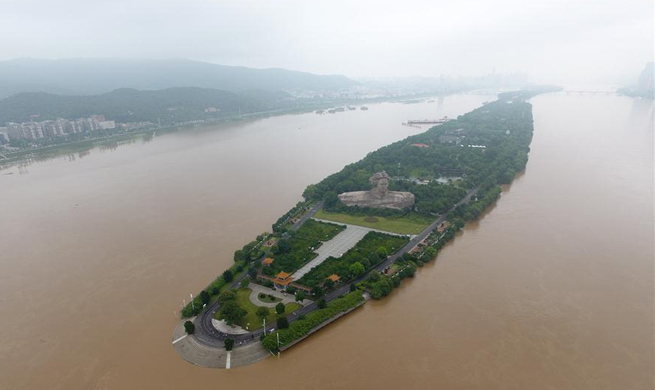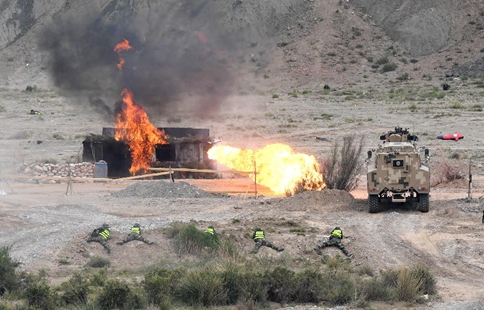ZAGREB, June 30 (Xinhua) -- The ruling of The Hague-based Permanent Court of Arbitration (PCA) on Thursday about a territorial dispute between Croatia and Slovenia has triggered different reactions in the two countries.
In response to the ruling, Croatian Prime Minister Andrej Plenkovic said Thursday "We do not consider ourselves obliged by this ruling, ...And we do not intend to implement its content."
He said the border issue between Croatia and Slovenia is a purely bilateral matter. "We stay ready, open and willing to solve the issue in a bilateral way with our neighbour," he said.
He also called upon all the states, "primarily EU members, and international organizations to leave this border dispute to Croatia and Slovenia as an open border issue which should be dealt with and resolved bilaterally between the two countries, and two countries alone".
Plenkovic was referring to the announcement of the German embassy in Zagreb which sided openly with Slovenia.
The Croatian prime minister's attitude is shared by Croatian opposition leaders, as well as the country's former presidents and prime ministers.
For his part, Slovenian President Borut Pahor, who initiated the arbitration in 2009 as then prime minister, told the media Thursday that the arbitration had proven to be the best way of solving the border dispute and that the rejection of the treaty does not exempt Croatia from implementing the ruling.
Slovenian Prime Minister Miro Cerar described the decision as a "historic" moment, stressing that the verdict is "final and legally-binding" on both countries.
Ivo Josipovic, a jurist and politician who served as the President of Croatia from 2010 to 2015, told Xinhua on Friday that Croatia shouldn't have agreed to such an agreement in the first place and that it made a right decision when it withdrew from the arbitration process in July 2015.
Former Prime Minister of Croatia Jadranka Kosor complained to Xinhua that the PCA didn't mention a word that one side withdrew from the arbitration. "When Croatia withdrew, the meaning of the arbitration disappeared. I hope one day we will find out why did they continue", Kosor argued.
She thinks that this case will have an effect on relations between Slovenia and Croatia. "Both governments now must do everything they can to prevent possible incidents. They have to start new negotiations from the beginning and solve this issue. You cannot change your neighbors, so it is better to resolve open disputes", Kosor stressed.
In a 380-page judgment, the PCA ruled on Thursday on the precise location of the long-disputed land and sea border between the two countries which emerged from the breakup of Yugoslavia in 1991.
The PCA rejected Ljubljana's demand that the whole of the Savudrija Bay (the Bay of Piran) was Slovenian territory, but gave Slovenia greater part of the disputed waters and a 2.5-nautical-mile wide, 10-nautical-mile long "junction corridor", thus giving Slovenia access to the High Seas through the Croatian territorial waters.
Croatia was not present in the courtroom of the Peace Palace in The Hague, the Netherlands, and did not attend the announcement of the ruling because it had withdrawn from the arbitration process in July 2015, claiming time and again it was "irreparably compromised" by Slovenia's illegal actions and making clear it will not accept the ruling and comply with it.
In November 2009, the then Prime Ministers of Croatia and Slovenia Jadranka Kosor and Borut Pahor signed an Arbitration Agreement, by which Croatia and Slovenia submitted their territorial and maritime dispute to arbitration. The Arbitration Agreement was subsequently ratified by the respective parliaments.
The arbitration proceedings began in early 2012. In mid-2015, Zagreb decided to leave the arbitration agreement after it was revealed that a judge at the PCA and the Slovene representative at the court had a secret and unauthorized conversation. They both resigned and Croatia withdrew, arguing that Slovenia had severely breached the treaty and violated the principles of fairness, legality, independence and credibility.
Croatia withdrew from the arbitration by invoking Article 60 of the Vienna Convention, which allows termination of an agreement in case of a grave breach. Croatia also expressed regret that the Tribunal had missed the opportunity to dissolve itself after the whole process lost any legitimacy.
The German Foreign Ministry issued a statement on Thursday in which it said that the PCA decision must be respected and that the both parties in dispute should implement a decision. While the U.S. embassy in Zagreb stated that it will not take sides in this case, but urged both countries to solve this problem bilaterally.

















